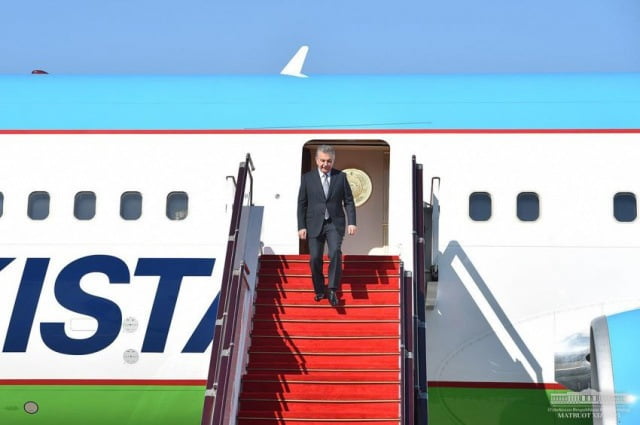
President of the Republic of Uzbekistan Shavkat Mirziyoyev has arrived in Baku to attend the events of the next summit of the Turkic Council.
First Deputy Prime Minister of Azerbaijan Yaqub Eyyubov, leadership of the Ministry of Foreign Affairs and other officials welcomed the distinguished guest.
The main events of the summit will be held on October 15. The President of Uzbekistan will also hold a number of bilateral meetings.
The Turkic Council membership is the first regional organization to welcome Tashkent in the past 13 years. Joining is a nod toward Turkey, which invited Uzbekistan to join the organization during Mirziyoyev’s visit to Ankara in October 2017. Uzbekistan will become the organization’s second largest member after Turkey.
The 10-year-old organization consists of founding members Azerbaijan, Kazakhstan, Kyrgyzstan, and Turkey. On September 16 Uzbekistan joined. At this point, Turkmenistan is the only regional Turkic speaking country outside the organization, but Ashgabat is reportedly contemplating taking on observer status. Turkmenistan, unlike Uzbekistan, has participated in council’s several past summits, while Tashkent made its first appearance in 2018, where Mirziyoyev spoke of Turkic roots of the member countries and amicable relations among the countries.
What attracted Uzbekistan to the organization was the council’s foundation on United Nations principles and norms, namely “international law, including sovereign equality, territorial integrity and inviolability of internationally recognized borders of states, as well as the maintenance of international peace, security and development of good-neighborly and friendly relations.” These principles hold priority for Uzbekistan and other Central Asian states which hold maintaining the sovereignty of their relatively young states as a key priority.
Despite the United Nations norms that under-gird the council’s foundation, membership offers few benefits at this point to Tashkent. The Turkic Council is primarily a political organization. Unlike, for instance, the EAEU, the organization lacks robust economic cooperation or members-only benefits. Neither are the council members working toward a regional infrastructure project. The only solid project is the Modern Silk Road Joint Tour Package to tour the member countries for sightseeing. Uzbekistan is interested in increasing the flow of tourists and membership is another advertisement avenue. Tashkent has been mulling about introducing its own Silk Road visa with several Central Asian countries, and it might merge those intentions with the Turkic Council’s tour packages.
Officially, Tashkent’s gave an extensive list of benefits of the membership, such as favorable conditions for trade and investment, simplification of customs procedures with an ultimate goal of free movement of goods, capital, services, and technology, simplification of financial and banking activities. However, practice shows that these activities are challenging to implement bilaterally, let alone multilaterally. It will be many years or even decades until these aspirational benefits will accrue. As of now the council is not actively working toward any of those agendas in specific.
Nevertheless, the new regional organization membership allows Uzbekistan to break its previous seclusion and depart from an inward-looking foreign policy. It indicates an openness to regional organizations. For Uzbekistan, council membership is another confirmation of its Central Asia first policy and a way to strengthen regional cooperation. It is clear that Uzbekistan wants to reap economic benefits from its membership, but that won’t happen until it works hard to shape and create them.





